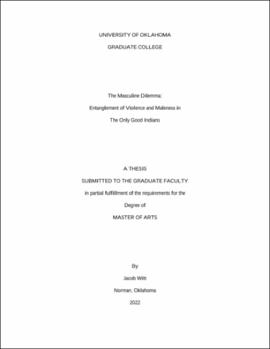| dc.description.abstract | This thesis examines the four Blackfeet male protagonists within Stephen Graham Jones’s "The Only Good Indians" in order to investigate stereotypes often applied to masculinity, specifically Indigenous masculinity. Examining portrayals of characters that demonstrate these stereotypes, this thesis is written to spark conversations about the why behind these social expectations, to recognize where stereotypes are rooted, and to build discussion about how to overthrow these conventions. Borrowing from—and entering into conversation with—Indigenous Gender Studies scholars such as Sam McKegney, Daniel Heath Justice, and others, this thesis relies upon real life experiences and realities in order to frame the conversation regarding portrayals of hypermasculine behaviors and internalized expectations. This thesis hopes to create discussions of how and why men act in certain manners, live in certain ways, or even make certain decisions by recognizing ourselves within Jones’s portrayals of his protagonists. | en_US |
